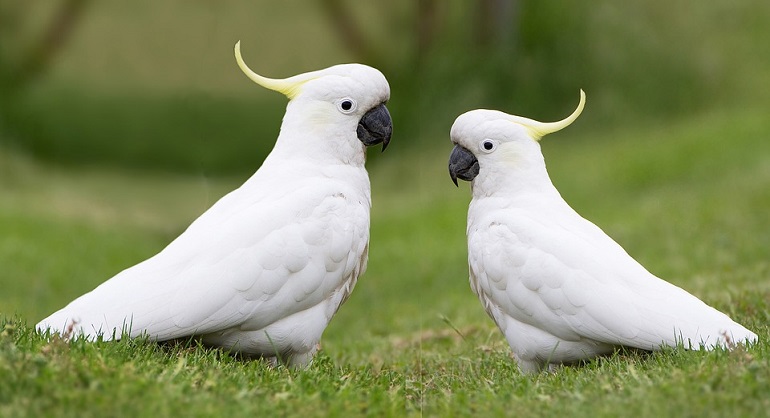Birds are more intelligent than humans. Many birds use tools, outsmart other animals, recognize faces, solve riddles, plan for the future, demonstrate empathy, and understand complex concepts. By observing a bird’s behavior, we may learn a lot about its intellect. Some birds look for food, build nests, and continue their daily activities similarly.
The challenge of identifying or evaluating intelligence in non-human animals makes scientific research on birds problematic. Birds have rather big brains in comparison to their head size. Birds communicate using visual signals as well as using calls and songs. As a result, analyzing reactions to sensory stimuli is commonly used to assess intelligence in birds.
Among the most intellectual creatures are the psittacines (parrots, macaws, and cockatoos) and corvids (ravens, crows, jays, magpies, etc.). Moreover, domestic poultry, pigeons, finches, and raptors have been often studied as intelligence subjects.
Bird intelligence has been studied by using a variety of traits and skills.
To what extent is a cockatoo smart
Scientific research on wild cockatoos has shown a cognitive level that has attracted scientists and challenged established beliefs about bird cognition. These birds have emerged as interesting topics. These Australian natives have various intellectual abilities that go beyond basic problem-solving, demonstrating their flexibility and complexity in interacting with their surroundings.
The ability of wild cockatoos to solve problems is one of their most impressive abilities. These birds have been given various tasks in controlled tests that call for item handling, obstacle avoidance, and inventive problem-solving techniques to get rewards. The outcomes have proved nothing short of astounding, as cockatoos have shown great adaptability in modifying their problem-solving strategies and effectively completing challenging tasks.
For wild cockatoos to receive food rewards, for instance, researchers simulated situations in which they had to open a puzzle box. The birds demonstrated a remarkable comprehension of cause and effect, utilizing trial-and-error techniques until finally devising effective plans to open the box. This kind of problem-solving behavior indicates an intellectual complexity that surpasses natural actions, demonstrating the capacity to assess and plan in the face of difficulties.
Beyond lab-based studies, field observations have yielded further information about cockatoos’ intellectual capacities. The use of tools is one remarkable behavior that was once thought to be unique to a small number of creatures. Cockatoos have been seen making tools out of sticks to remove insects from tree bark. This not only demonstrates their capacity for innovation but also challenges traditional views about the range of animals capable of tool use.
Another intelligent trait exhibited by wild cockatoos is communication. Although many bird species imitate sounds, cockatoos have an amazing capacity to produce complex vocalizations. The sounds they make feature complex patterns and even the development of new vocal combinations, rather than just being monotonous repeats of outside sounds. The intricacy of cockatoo vocalizations and some parts of human language have been compared by certain researchers, raising the possibility that these birds have more advanced ways of communicating than previously believed.
Cockatoos have additional cognitive abilities in memory. According to studies, these birds have a considerable long-term memory ability. People have been seen to retain the locations of food sources for lengthy periods, which suggests that they have cognitive abilities beyond short-term memory. Their ability to identify resources and travel large areas is probably greatly aided by this memory capability.
The traditional order of intelligence, which has traditionally been more strongly linked to mammals, especially primates, is called into question by the finding of such advanced cognitive capacities in wild cockatoos. The study of these birds emphasizes how important it is to extend our knowledge of intelligence throughout the animal kingdom and to recognize the various ways that different species adapt to and flourish in their habitats.
The fact that these studies are mostly concerned with wild cockatoos should be emphasized since it highlights the value of researching animals in their natural environments. The difficulties and complexities that wild cockatoos encounter in their surroundings help in the growth of their cognitive capacities. This comprehensive method of researching animal intelligence highlights the complex interaction between an animal’s behavior and its natural environment.
The scientific study of wild cockatoos has revealed a level of intellect not before identified with bird species. Their problem-solving ability, tool usage, sophisticated communication, and long-term memory challenge established beliefs and expand our knowledge of the animal kingdom’s cognitive powers. Wild cockatoos are outstanding instances of adaptation and intelligence, inspiring greater investigation into the complicated interaction between an animal’s mind and its surroundings.
- About the Author
- Latest Posts
A passionate advocate for all natural and sustainable ideas. With a background in sustainable economics science and a deep love for nature, Sojy has dedicated his career to promoting eco-friendly practices and encouraging others to live a more sustainable lifestyle. He is an avid hiker, gardener, and cook, and loves experimenting with natural ingredients in his recipes and lifestyle routines. Sojy believes that small changes can make a big impact and is constantly seeking out new ways to reduce his carbon footprint and inspire others to do the same




